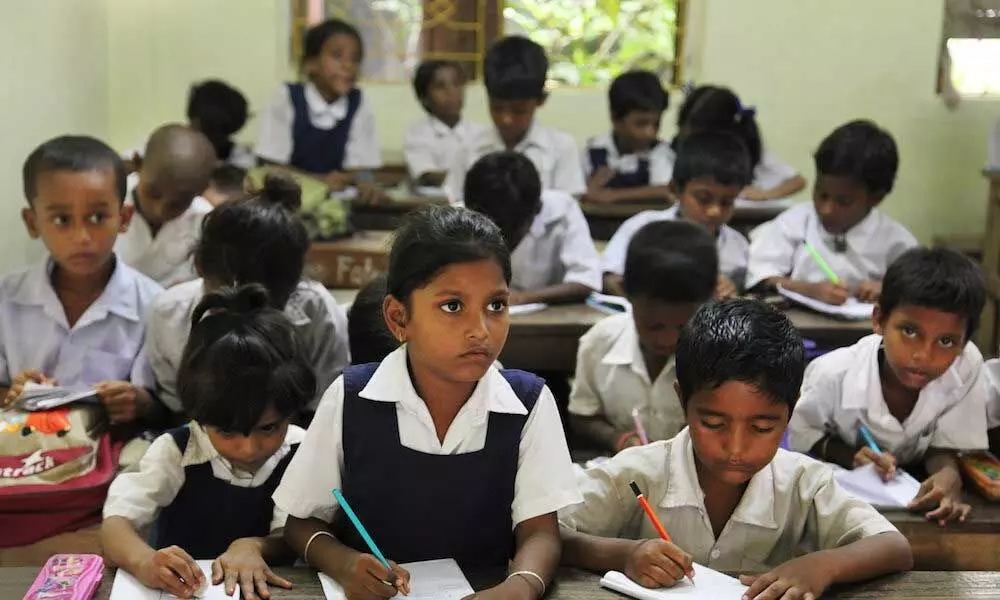APU study highlights the loss of foundational learning for children during the Pandemic

APU study highlights the loss of foundational learning for children during the Pandemic
A field study School closure due to the COVID-19 pandemic has led to complete disconnect from education for the vast majority of children or inadequate alternatives like community-
A field study School closure due to the COVID-19 pandemic has led to complete disconnect from education for the vast majority of children or inadequate alternatives like community- based classes or poor alternatives in the form of online education, including mobile phone-based learning.
The Study on 'Loss of Learning during the Pandemic' was released on Wednesday.
Prolonged closure of schools during the COVID-19 pandemic, for almost an entire year, has had a significant negative impact on the learning levels of children. This loss of learning comprises both the loss of regular curricular learning that children would have acquired if schools remained open, as also students 'forgetting' abilities learnt in the previous class. The study, undertaken in January 2021, reveals the extent and nature of the 'forgetting/regression' among 16067 primary school children in 1137 schools in 44 districtsacross 5 states.
The key findings of the study are that 92% and 82% of children on an average have lost at least one specific foundational ability from the previous year across all classes for language and mathematics, respectively.
Children acquire foundational abilities in language and mathematics during primary school that form the basis of further learningin all subjects. Some of these foundational abilities, for example, are reading a paragraph with comprehension, expressing the gist in your own words, adding and subtracting numbers. Over 2000 teachers and over 400 members of the Azim Premji Foundation conducted a rigorous assessment of the learning levels of these children as in January 2021 in comparison to their learning levels on the same class appropriate foundational abilities when schools closed in March 2020.
'Covid-19 has battered India and the world. The loss of the educational year compounded by the phenomenon of academic regression is one such significant effect. This deep cumulative loss has to be confronted. Most importantly, when schools reopen, teachers have to be given time to cover this deficit and be provided with other support. A carefully synchronized set of measures across states will be required. Including eliminating vacations, extending the academic year well into 2021 and perhaps beyond –depending on when schools open, reconfiguring the syllabus, realigning college sessions, and more.' said Anurag Behar, Vice Chancellor, Azim Premji University.
The report emphasizes that the extent and nature of learning loss is serious enough to warrant action at all levels. Supplemental support, whether in the form of bridge courses, extended hours, community-based engagements and appropriate curricular materials, will be needed to help children gain the foundational abilities when they return to school. Teacher capacity to ensure student learning in these unusual circumstances must be in focus, particularly with respect to pedagogy and assessment needed to deal with students at diverse learning levels. Teachers must be given enough time to compensate for both kinds of learning loss – and we must not rush in to promoting children to the next class.
Box:
Learning loss in language
• 92% of children on an average have lost at least one specific language ability from the previous year across all classes.1
• Illustratively, these specific abilities include describing a picture or their experiences orally; reading familiar words; reading with comprehension; writing simple sentences based on a picture.
• 92% of children in class 2, 89% in class 3, 90% in class 4, 95% in class 5, and 93% in class 6 have lost at least one specific ability from the previous year.
Learning loss in mathematics
• 82% of children on an average have lost at least one specific mathematical ability from the previous year across all classes.2
• Illustratively, these specific abilities include identifying single- and two-digit numbers; performing arithmetic operations; using basic arithmetic operations for
solving problems; describing 2D/3D shapes; reading and drawing inferences from data.
• 67% of children in class 2, 76% in class 3, 85% in class 4, 89% in class 5, and 89% in class 6 have lost at least one specific ability from the previous year.







